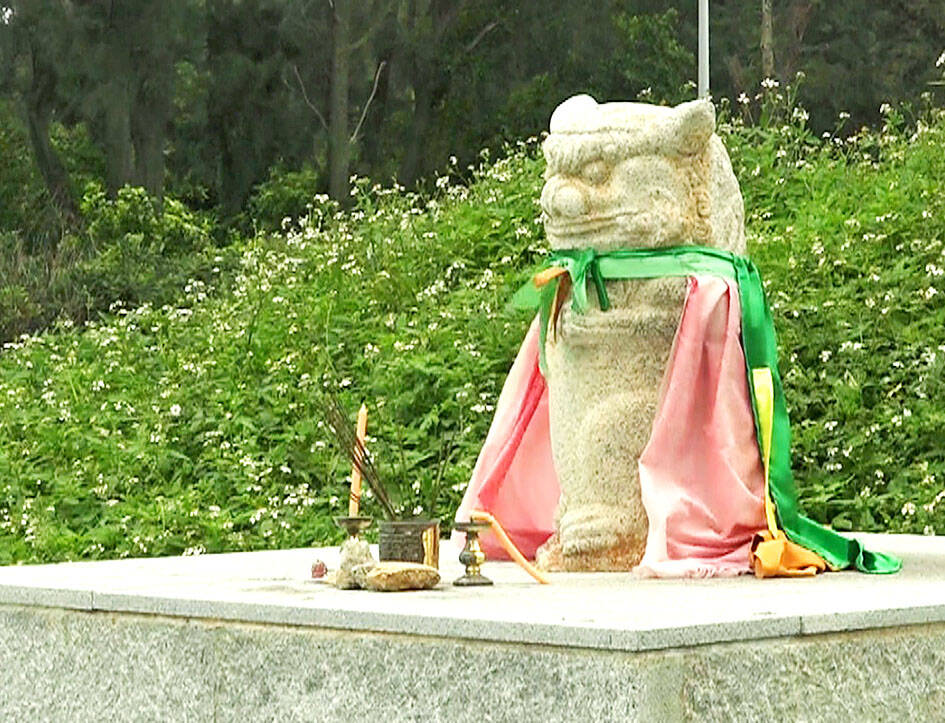People visiting Kinmen during the Lunar New Year holiday should visit the Wind Lion Gods, the guardians that embody the memories and history of the outlying county and serve as a symbolic part of its cultural landscape, the Kinmen County Tourism Department said.
The Wind Lion Gods — or “Wind Lion Masters” (風獅爺) in Mandarin — are stone sculptures brought to Kinmen from Quanzhou and Zhangzhou in China to protect the group of islands from evil spirits, bad luck and natural disasters, including monsoon winds that are particularly fierce during the winter months, information on the department’s Web site says.
There are about 100 stone lions around Kinmen, which is only 10km east of the Chinese city of Xiamen, with some painted in bright colors and others sporting fierce expressions. The “females” are often decorated with pom-poms or ribbons.

Photo: CNA
Over time, the lion sculptures have become deeply entwined with local legends, said Chang Che-jui (張哲叡), a representative of the local travel company Whoyo Travel.
The lions are believed to possess special abilities, such as discovering lost items, catching thieves and protecting the islands from intruders, Chang said.
The Anqi Wind Lion God, the tallest among the lot at 3.78m, is painted in green, red, blue and yellow, and stands guard over the sea frontier.
Legend says it once fended off invading pirates, the department said.
Local residents often make cloaks for and bring offerings to the wind lions to “thank” them for their good deeds, it said.
However, the lions’ powers were not always so revered, Chang said.
A lion statue in the Guningtou (古寧頭) region shows visible cracks on its ears and teeth, even after being restored to repair damage caused by nearby residents.
It is believed that the lion’s open mouth, facing the Lincuo neighborhood, emitted negative energy and disrupted the area’s feng shui (風水).
Chang recommended that visitors check out a chubby yellow wind lion in Jinning Township’s (金寧) Husia Village (湖下) that he found particularly cute.
In Lieyu (烈嶼), which lies west of Kinmen’s main island, the “Wind Chickens” are similarly revered, he said.
The stone chickens perched atop residents’ roofs and at village entrances have the power to control the wind and protect locals from evil spirits, the department said.
Kinmen is also known for its military legacy as a front-line against the Chinese Communist Party, given its proximity to China, it said.
As well as tanks and forts on display, history can be seen in residential villages, from tunnels people took shelter in to holes in the walls of houses, the department added.

Costa Rica sent a group of intelligence officials to Taiwan for a short-term training program, the first time the Central American country has done so since the countries ended official diplomatic relations in 2007, a Costa Rican media outlet reported last week. Five officials from the Costa Rican Directorate of Intelligence and Security last month spent 23 days in Taipei undergoing a series of training sessions focused on national security, La Nacion reported on Friday, quoting unnamed sources. The Costa Rican government has not confirmed the report. The Chinese embassy in Costa Rica protested the news, saying in a statement issued the same

Taiwan’s Liu Ming-i, right, who also goes by the name Ray Liu, poses with a Chinese Taipei flag after winning the gold medal in the men’s physique 170cm competition at the International Fitness and Bodybuilding Federation Asian Championship in Ajman, United Arab Emirates, yesterday.

A year-long renovation of Taipei’s Bangka Park (艋舺公園) began yesterday, as city workers fenced off the site and cleared out belongings left by homeless residents who had been living there. Despite protests from displaced residents, a city official defended the government’s relocation efforts, saying transitional housing has been offered. The renovation of the park in Taipei’s Wanhua District (萬華), near Longshan Temple (龍山寺), began at 9am yesterday, as about 20 homeless people packed their belongings and left after being asked to move by city personnel. Among them was a 90-year-old woman surnamed Wang (王), who last week said that she had no plans

TO BE APPEALED: The environment ministry said coal reduction goals had to be reached within two months, which was against the principle of legitimate expectation The Taipei High Administrative Court on Thursday ruled in favor of the Taichung Environmental Protection Bureau in its administrative litigation against the Ministry of Environment for the rescission of a NT$18 million fine (US$609,570) imposed by the bureau on the Taichung Power Plant in 2019 for alleged excess coal power generation. The bureau in November 2019 revised what it said was a “slip of the pen” in the text of the operating permit granted to the plant — which is run by Taiwan Power Co (Taipower) — in October 2017. The permit originally read: “reduce coal use by 40 percent from Jan.